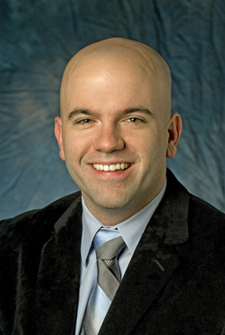
Assistant Professor Jim Pfaendtner has been named a National Science Foundation (NSF) Faculty Early Career Development (CAREER) Award 2012 recipient. His proposal, “Computational Enzymology of Non-Aqueous Biocatalysis: Application to Biomass Pretreatment” will receive $450,000 in funding starting this month.
NSF CAREER Awards are the foundation’s most prestigious awards for junior faculty. The awards are given to teacher-scholars for their excellence in research, education, and the integration of education and research.
Pfaendtner’s CAREER award will be used to make improvements to bioprocessing by developing and validating a new multi-scale computational modeling toolkit for the discovery and optimization of bioprocess solvent environments. The group will examine the relationship between solvent, enzyme structure, and reactivity, specifically targeting the ability to relate molecular features of the solvent to its effect on enzyme stability and activity.
Vance Jaeger, a second year graduate student and researcher in Pfaendtner’s lab, will benefit from the CAREER Award funding. “Vance has been instrumental in starting up a new project in my group looking at engineering new systems/processes for biochemical reactions in unconventional media,” said Pfaendtner. “The research funding is primarily for computational work but there is a focus in the grant on performing experimental validation of some of our simulations. This will be done in collaboration with Prof. François Baneyx and Prof. Lilo Pozzo.”
While many of ChemE’s faculty members have won CAREER awards, Pfaendtner’s award brings with it a unique honor. “Jim’s is the first CAREER award in the department that was co-funded by the Chemistry Division and the Chemical, Biological, Environmental, and Thermal Division of NSF,” said Chair Dan Schwartz. “Jointly reviewed CAREER proposals can be reviewed by a panel with far-ranging areas of expertise and focus so it is especially noteworthy that the proposed work was both fundamental molecular science and had important use-inspired molecular engineering scholarship that impressed both set of reviewers.”
Pfaendtner feels his interdisciplinary work, at the interface of chemistry, physics, biology and engineering, made it easier for the joint panel to connect with the scope and goals of the project. “I did not know in advance that the award would be considered for joint funding, so it is a true honor to be selected from a large group of world-class scholars.”